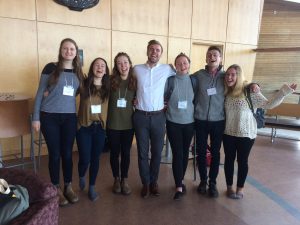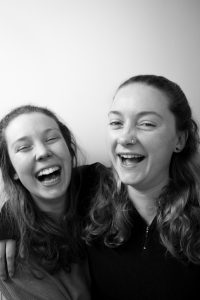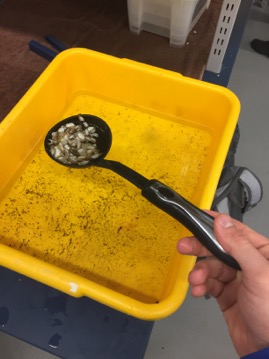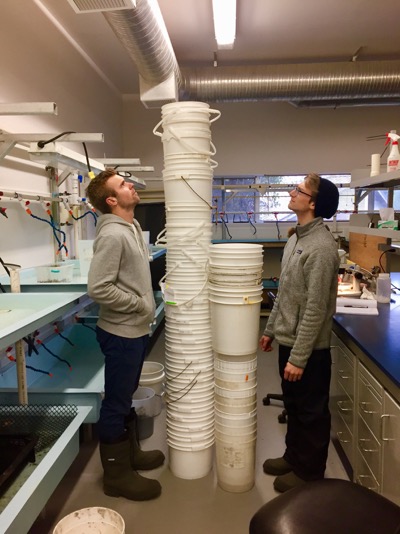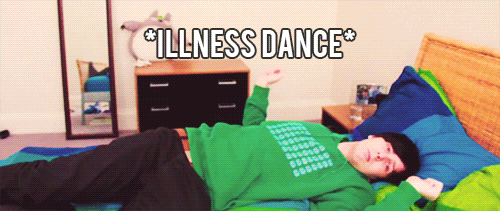The ‘PEEC’ of undergraduate research
So there we were: hands clasped at our sides, eyes transfixed on the stage ahead, and armpits glistening with an over-abundance of sweat that can only be caused by two things – jalapeño peppers, or (in this case) presenting our own research at a scientific conference for the very first time.
This past weekend, my friends and I (all of whom attended the Bamfield Marine Sciences Centre Fall Program) decided to showcase our newly-conducted research at the Pacific Ecology and Evolution Conference in Bamfield, a small town on Western Vancouver Island. Most of us hailed from the UVic Biology department, and all of us were nervous and in need of anti-perspirant.
The conference was comprised mainly of undergraduate and graduate students in Biology, Environmental Studies, Geography, and Anthropology, all of whom had done research that they wanted to show to the world. Presenters were divided into three categories: 3-minute fast-talks, 12-minute talks, or untimed poster presentations. Each division was given the spotlight at some point in the weekend.

The road trip crew embarked on what would be a treacherous journey from UVic to Bamfield. We sang. We napped. We ate snacks to our heart’s content. Needless to say, I found the road trip lifestyle very appealing.
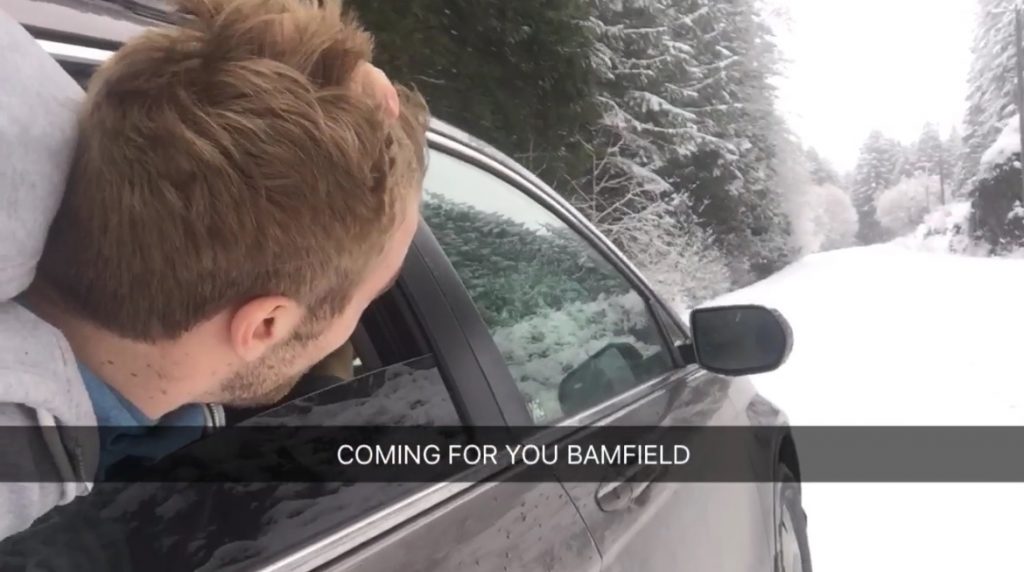
Here’s the logging road up to Bamfield. The interesting thing about Vancouver Island is that our weather is not confined by the mere boundaries of ‘seasons’.
Why am I telling you about this?
Well, it has occurred to me that
1. This research is essentially the pinnacle of my (and my friends’) undergraduate degree; we have finally made that first transition from being what some of my professors call strictly consumers to producers of information. That is – we are no longer solely learning about what other scientists have done, but contributing to the scientific community with our own research and experiments. We have successfully passed through the difficult, seemingly endless grind that can come from navigating a university undergrad, and are just starting to see some of the rewards in the form of research opportunities, graduate positions, and biology-related jobs.
2. This strange, new realm of breaking free out of the classroom and into the scientific world is concisely packaged by the PEEC conference – it’s a whole conference full of undergrads and graduate students just like us! Also nervous, and likely almost as sweaty.
3. These students (now scientists) were all once undergrads just beginning a biology degree, and they all have experiences and advice that can help others who may be unsure of how to get further involved in the world of scientific research!
So, I interviewed and asked people at this conference to do just that: to give advice – a turning point or a game-changer – in the form of one specific action that an undergraduate can do to bring themselves to this point – this change from solely studying textbooks, to contributing real-world research. I’ll be introducing each of these UVic students, what their research is, and their advice for undergraduate students to (hopefully) make the science undergrad path a little easier.
Rachel Rickaby and Jeanine Sinclair
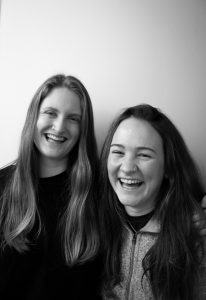 Faculty: Biology (concentration: Marine Biology)
Faculty: Biology (concentration: Marine Biology)
Research: “Mussels can react to local crab predators (red rock crab), but not invasive ones (European green crab)”
Advice to students:
In essence, the dynamic duo recommend that incorporating science into your social life is key.
“Don’t be afraid to talk a lot of what you are passionate about to your friends”, said Jeanine, “instead, orient your friend group [to your passions]”.
Rachel added: “Because once you start expressing what you like with your peers, it’s that much easier to take that [discussion] moving forward to a TA, or a prof.”
One-action takeaway:
- Have a conversation with your friends about what things you enjoy, especially based on what you are taught in the classroom.
- Start doing interest-based research, and keep updated on notifications from biology-themed pages (e.g. on social media).
Extra notes for undergrads?
The pair had a few key pieces of advice for those struggling to find a place in the biology undergrad community:
- Rachel: “join the UVic ecology mailing list (on Facebook)” and, “It’s really generic, but… JUST GET INVOLVED. If you just go to classes and go home every day, it’s [more difficult] to find something you want to research yourself, and end up doing what you want” – like field school! (i.e. shameless plug for the Bamfield Marine Sciences Centre)
- Jeanine: “Connect with the biology club at the school (BUGS).”
- Rachel: “Scientists are people! And they are not scary to talk to.”
Mary Clinton and Olivia Walker*
Research Question: “Do waves affect the shape of limpet shells, and does shell shape change how vulnerable they are to being eaten by crabs?”
*Mary and Olivia are no longer undergraduates and not originally from UVic (I met them at the BMSC of which UVic is a member university), but I couldn’t let them leave without asking them to share some knowledge.
Advice to students:
Again bringing in the importance of the social aspect of biology, Olivia and Mary found some of the most helpful advice they could give, to be breaking the initial ‘comfort’ barrier between student and teacher:
- “If you are interested in what someone does, or see something interesting that you like, don’t be afraid to ask more about it (regardless of their academic status).”
- Also, “TAs have been really helpful as connections to people. They can not only assist you in biology, but can just be someone to share knowledge, stories, and science-themed puns with.”
- “Don’t be afraid of the term ‘networking’. I feel like it’s a weird term [for scientists] because it’s thrown around negatively a lot – to get ahead or climb some ladder. But in Biology it’s used because you want to get to know someone (or a group of people) who likes the same thing you do!”
One-action takeaway:
Ask your TA about something you’re interested in: they likely went through a similar track as you, and they can help you find resources in either the classroom or volunteering, and they also are generally excellent bio-themed conversationalists.
Extra advice from the PEEC conference:
“Research doesn’t have to be fancy to be good”.
Side note: these were especially helpful words for yours truly. My experiment used primarily kitchen forks, buckets, and a ladle as tools (see below). I mean, my ‘methods section’ was essentially a kitchen recipe. So if you’re ever sceptical about how ‘high-tech’ a project has to be – don’t worry about it.
Talen Rimmer (yours truly) and Rylan Command
Rylan – Biology (major) and statistics (minor)
Talen – Biology and Environmental Studies (double major)
Research Question: “Do geoducks die when you turn them over”? (Effect of angular orientation on mortality and burrowing behaviour in geoducks)
Advice to students:
- On the idea of networking, “I think the negative connotation of networking comes from people going out with the intent of ‘I’m going to speak to this person with the sole intent of bettering myself’ – and that kind of dehumanizes people in that way. And as we said earlier, that’s not what networking is in 99% of cases.”
- “I think in biology (and especially here at UVic) we’ve been really lucky because we get to hear about international-scale work done by our professors, and afterwards, not only do you want to work with them but you wanna be their best friend because they’re just really cool people” – so talk to them! – Rylan
One-action take-away:
Please, please, never feel daunted or unworthy to pursue research because of your grades. Just like your grades don’t determine your worth as a person, they also don’t determine your worth as a biologist – if you love what you do, and you are willing to work hard for it, there are always resources and ways to get involved.
Extra take-away from this conference: Science communication is key!
“We’ve been told through our degree that science communication is important. However, the ‘Sci-Comm’ workshops at PEEC showed us the importance of getting your research out there, especially now as an undergraduate student – and it can have a big impact on your network of scientists. Developing science communication skills is an undervalued but very important part of the scientific method”
Conclusion
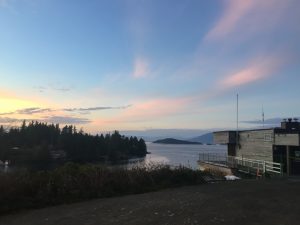 Based on my interviews, I found a surprising amount of focus on talking to your teachers and TAs. But then again, these are likely the best-equipped people around you to help you explore this new realm of scientists, or just be a friend.
Based on my interviews, I found a surprising amount of focus on talking to your teachers and TAs. But then again, these are likely the best-equipped people around you to help you explore this new realm of scientists, or just be a friend.
If you’re feeling a bit stressed by the amount of ‘socializing’ talk that was recommended here, remember that every person (and scientists are people, as we learned) is different. For example, if you didn’t feel comfortable with speaking in front of a large audience, the poster section of this conference only required speaking to groups of usually 5 or less.
In short – if you want to pursue research, but never found it accessible, available or realistic, consider this an invitation: there are fantastic people and resources at this university that want to talk to you, and can help you achieve what you’re after.
Acknowledgements
I wanted to thank the Bamfield Marine Sciences Centre, my friends who let me rattle their brains and stay on their couch (Mary, Liv, Syd, Mae, Need, Rach, and Rye), and a HUGE thank you to the MyUVicLife blogging team for making this conference possible for me – I am so grateful for marking this as another chapter in my undergraduate career. Thanks to Sophia Kontou for taking researcher photos.

